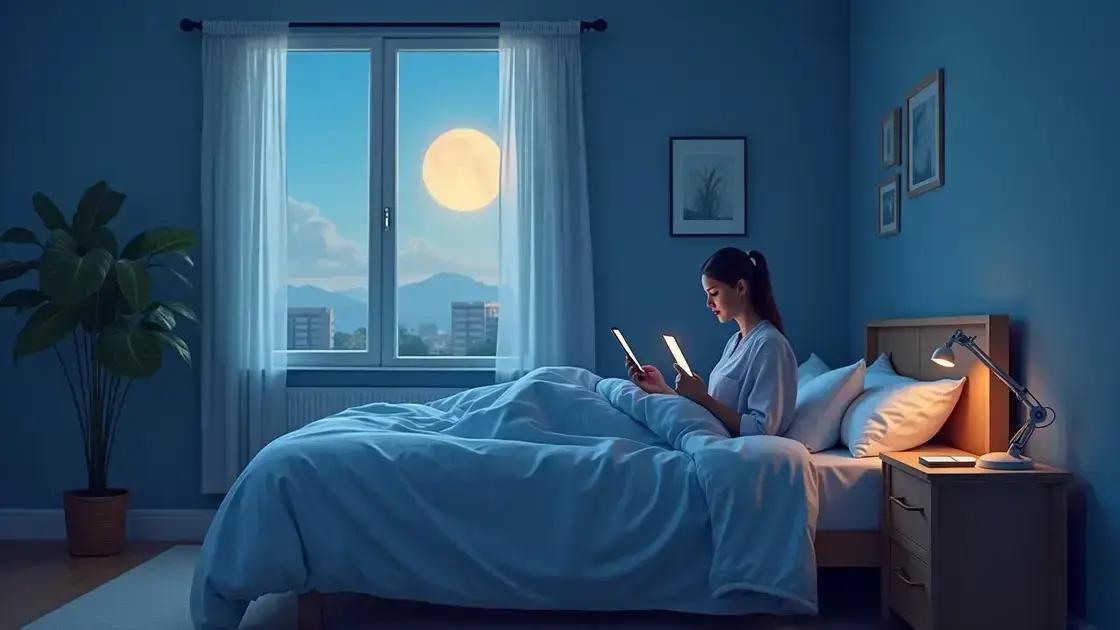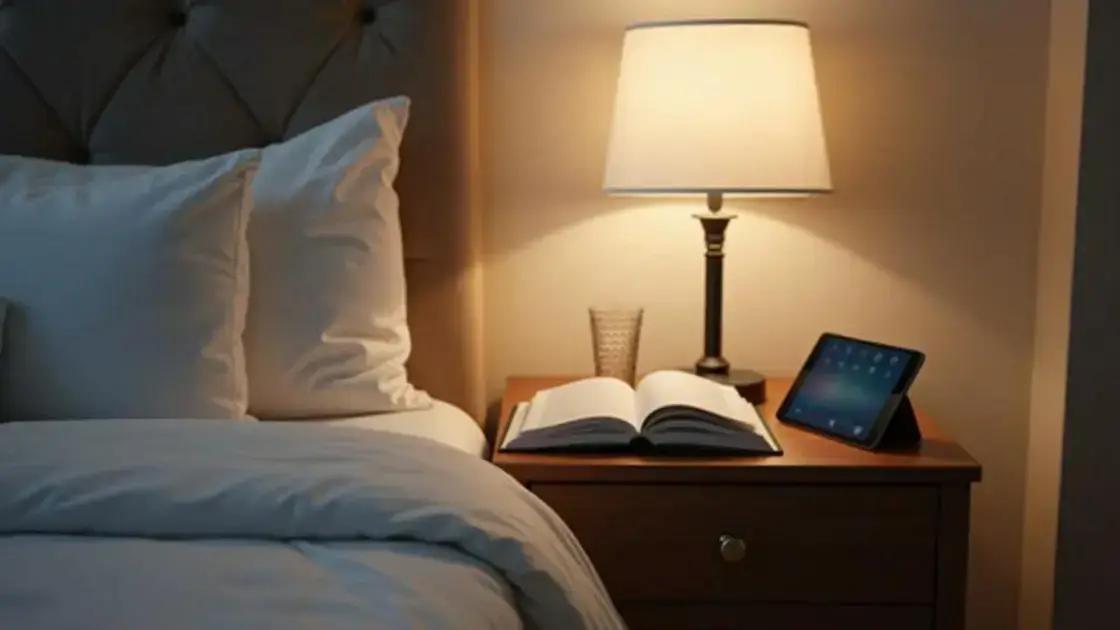Reducing screen time is crucial for improving sleep quality, as excessive exposure to screens, especially before bedtime, disrupts melatonin production. Implement practical strategies such as setting screen limits, creating a tech-free sleep environment, and recognizing the numerous benefits of quality sleep, including enhanced mental and physical health.
Many people experience poor sleep quality due to excessive screen time, especially before bed. In our modern world, screens have become an integral part of our lives, impacting our health and well-being. By understanding how screen time affects sleep and establishing healthier habits, we can improve our sleep quality. This article will provide practical tips and insights to help you reduce screen time and create a health-focused nighttime routine.
Understanding the Link Between Screen Time and Sleep

Many people do not realize the profound impact that screen time has on sleep quality. When we use devices like smartphones, tablets, or computers, especially before bedtime, we expose ourselves to blue light. This light can interfere with our natural sleep cycles by suppressing the production of melatonin, the hormone responsible for regulating sleep.Studies show that excessive screen time can lead to difficulties in falling asleep and staying asleep.
How Blue Light Affects Sleep
Blue light emitted from screens mimics daylight, tricking our brains into thinking it is still daytime. Because of this, our bodies may struggle to unwind as night approaches. It is often harder to feel tired, making it difficult to achieve restful sleep.
Additionally, engaging with stimulating content such as videos or social media can increase alertness. This excitement can lead to prolonged screen time, which compounds the issue and further disrupts sleep patterns.
Other Factors Related to Screen Time
Besides blue light, other factors may contribute to poor sleep quality when using screens. The content we watch or read before bed plays a significant role as well. If it is stressful or disturbing, it can lead to anxiety that affects our ability to relax and fall asleep.
Virtual interactions prior to bed, such as social media or online gaming, may keep our minds active when we should be winding down. These interactions can create a sense of urgency and distract us from the calming bedtime routines needed for quality sleep.
In summary, understanding the link between screen time and sleep is crucial for anyone looking to improve their sleep quality. By recognizing the effects of blue light and content engagement, we can make more informed choices about our screen habits in the hours leading up to bedtime.
Practical Tips to Reduce Screen Time

Reducing screen time can help improve sleep quality. Here are some practical tips to get started:
Set Specific Screen Time Limits
Establish clear limits for daily screen time. Use settings on devices to monitor and restrict usage. For example, consider limiting recreational screen time to just one or two hours per day.
Create a Tech-Free Zone
Designate certain areas in your home, like the bedroom and dining area, as tech-free zones. This encourages family interactions without the distraction of screens, helping everyone to connect and unwind.
Establish a Nightly Routine
Create a calming bedtime routine for at least 30 minutes before sleep. Engage in relaxing activities like reading a book, journaling, or practicing meditation instead of using screens.
Use Blue Light Filters
If you must use screens in the evening, enable blue light filters on your devices. Many devices come with settings to reduce blue light, which can minimize its effects on sleep.
By applying these practical tips, you can effectively reduce screen time and improve your sleep quality, leading to better overall health.
How to Create a Sleep-Friendly Environment

Creating a sleep-friendly environment is essential for improving sleep quality. Here are some key steps to help you transform your bedroom into a restful retreat:
Keep the Room Dark
Dark environments signal to your body that it is time to sleep. Use blackout curtains or shades to block out any light from outside. You can also consider using an eye mask if complete darkness is not achievable.
Maintain a Comfortable Temperature
The ideal sleeping temperature varies by person, but generally, a cooler room is more conducive to sleep. Aim for a temperature between 60-67°F (15-19°C) to help your body relax and drift into sleep.
Minimize Noise
Noise can disrupt sleep, so strive to create a quiet atmosphere. If you live in a noisy area, consider earplugs or a white noise machine to drown out distractions. Soft sounds can also aid relaxation.
Choose the Right Bedding
Comfortable bedding, including pillows and mattresses, plays a vital role in sleep quality. Invest in a mattress that supports your sleep position and pillows that keep your neck aligned. Soft, breathable sheets can enhance comfort further.
By following these tips, you can create a sleep-friendly environment that promotes relaxation and restfulness, ultimately leading to better sleep quality.
Benefits of Quality Sleep on Overall Health

Quality sleep provides numerous benefits for overall health. Here are some key advantages of getting enough good sleep:
Improved Mental Health
Good sleep is essential for mental well-being. It helps reduce stress, anxiety, and symptoms of depression. When you sleep well, your brain can process emotions and memories better, improving mood and mental clarity.
Enhanced Physical Health
Sleep plays a vital role in physical health. During sleep, your body repairs tissues, builds muscle, and strengthens the immune system. Quality sleep can lower the risk of heart disease, diabetes, and obesity.
Better Cognitive Function
Getting enough quality sleep enhances focus, creativity, and problem-solving skills. Well-rested individuals are more productive, make better decisions, and retain information more effectively.
Stronger Immune System
A good night’s sleep supports a strong immune response. During sleep, the body produces cytokines, proteins that help combat infections and inflammation. This can lead to fewer illnesses and faster recovery.
Incorporating healthy sleep practices can significantly boost these health benefits, contributing to a happier and healthier life.
In Summary: Prioritize Sleep for Better Health
Reducing screen time and enhancing sleep quality are essential for improving overall health. By understanding the link between screen time and sleep, implementing practical tips to reduce screen usage, creating a sleep-friendly environment, and recognizing the numerous benefits of quality sleep, you can take significant steps towards better well-being.
Good sleep not only improves mental and physical health but also enhances cognitive function and strengthens the immune system. Prioritizing it in your daily routine can lead to a happier and healthier life.
Make these changes today to reap the wonderful benefits of restful nights and energized days ahead.
FAQ – Frequently Asked Questions About Reducing Screen Time for Better Sleep Quality
How does screen time affect sleep quality?
Screen time, especially before bed, exposes you to blue light, which can disrupt melatonin production and make it harder to fall asleep.
What are some practical tips to reduce screen time?
Set specific screen time limits, create tech-free zones, establish a calming nighttime routine, and use blue light filters on devices.
How can I create a sleep-friendly environment?
Ensure your bedroom is dark, maintain a comfortable temperature, minimize noise, and choose comfortable bedding to promote better sleep.
What are the benefits of quality sleep on overall health?
Quality sleep improves mental health, enhances physical health, boosts cognitive function, and strengthens the immune system.
How can I prioritize sleep in my daily routine?
By reducing screen time, creating a conducive sleep environment, and following healthy sleep practices, you can prioritize and improve your sleep.
Is it possible to adjust my sleep schedule gradually?
Yes, making small adjustments to your bedtime and wake-up time each day can help your body adapt to a new sleep schedule.












